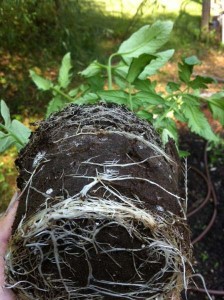 Coming home was wonderful. I had an amazing gift waiting. Mr. Petrol Head had dug and turned and weeded and prepped all the garden beds. It took him two weekends and most of a week of evenings to get them ready for me to seed and plant. I hadn’t expected it and I was incredibly grateful as I’d pretty much resigned myself to a smaller garden and a much later start this year. But before I could get outside, I had a few last minute copy edits to finish for Stepping Out, royalty statements to sort through, a number of business issues to deal with and critique pages to read for a writer’s retreat I attended the weekend after I got back.
Coming home was wonderful. I had an amazing gift waiting. Mr. Petrol Head had dug and turned and weeded and prepped all the garden beds. It took him two weekends and most of a week of evenings to get them ready for me to seed and plant. I hadn’t expected it and I was incredibly grateful as I’d pretty much resigned myself to a smaller garden and a much later start this year. But before I could get outside, I had a few last minute copy edits to finish for Stepping Out, royalty statements to sort through, a number of business issues to deal with and critique pages to read for a writer’s retreat I attended the weekend after I got back.
Re-entry and getting back to the writing routine was taking longer than normal. I didn’t question it; I expected the first week back to be busy. But as I planted the garden, it occurred to me that my resistance was about more than having too much on my plate.
I had some heavily pot bound tomato plants to get into the ground. As I broke apart the root ball, set them into rich, loamy soil and watered them in, I thought about how much they’d appreciate their new digs. Once they got over the initial shock of being transplanted, they’d be quick to take advantage of the unlimited space to grow, sending out new shoots and eventually – hopefully – setting luscious tomatoes we’d gorge on all summer long. Being unconstrained would result in a significant transformation.
I realized I needed a transformation of my own. My trip away wasn’t a rest by any means, but it was enough of a break to point out that I was feeling pot bound too. Boxed in by the never-ending demands of the publishing industry . . . by demands I’d put on myself. I’ve been writing for two decades. My twentieth book will be published next year. The publishing landscape looked quite different when I started out. There was no twitter, Facebook, Instagram or LinkedIn. Blogs were a thing of the future. So were e books. Marketing and promotion was done, for the most part, by publishers. A book a year was considered a respectable output. These days it’s not unusual for writers to produce two, three, even four titles a year. Some of those might be shorter books but the goal is clear: get your name out and keep it there. While you’re at it, make sure you have a social media presence, engage with your readers, market and promote yourself. And make sure you’re reachable by email 24/7 too.
I love to write. It’s as necessary to me as breath. I appreciate email. It’s fun to share on social media. And the changing landscape of publishing is creating opportunities I couldn’t have dreamt up two decades ago. It’s all good.
Except when it isn’t.
Opportunity and possibility often bring growth. Slow, steady growth is a good thing. Wild, exuberant growth may be exciting to watch but it can lead to trouble. When potted plants grow too fast and their roots don’t have enough space, they become pot bound. Eventually the soil becomes so compacted that the roots can’t take up nourishment and they fail to thrive.
The market demands writers grow quickly these days: set daily word counts, produce more books, maintain a mailing list, attend conferences. Do, do, do. Go, go, go. And without enough down time or space in our days to fill the well or feed the muse or simply refuel, we risk getting pot bound ourselves. We risk burnout.
Root disturbance can be a good thing. It leads to change and growth. So now that my outside garden’s planted, it’s time for a little inner root disturbance. It’s time to regroup, rethink, reprioritize. To examine my boundaries and look at what’s important on both a personal and professional level. To incorporate a little more reading time, puttering time, beach time, alone time.
A plant needs space in which to grow. People do too. So this summer I’m giving myself the gift of space. I’ve always seen it as a bit of a luxury. But thanks to another lesson from the garden, I realize it’s a necessity. 

LOVE the article, especially the use of the pot-bound plants to illustrate the point. I do agree that it’s good to take a break sometimes and look at where we’ve been and where we seem to be headed. Change isn’t always necessary, but when it is, new earth to grow in may be as empowering as it is scary.
And new earth to grow in doesn’t necessarily mean getting rid of the old earth, but rather providing a bigger container so old and new can co-exist and thrive. In order to do that, though, I need to gain some perspective.
Exactly!